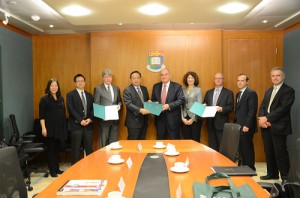New agreements with top universities in Hong Kong, IU SPEA establishes dual degree program

IU President McRobbie and HKU President Lap-Chee Tsui (center) at signed new partnership agreements, including a dual degree program between HKU’s Faculty of Social Sciences and IU’s School of Public and Environmental Affairs (SPEA).
On Monday, President McRobbie visited the University of Hong Kong (HKU) and the Hong Kong University of Science and Technology (HKUST), where he signed agreements to strengthen and expand upon IU’s connections with the two institutions.
HKU is the oldest institution of higher education in Hong Kong, founded in 1910. The research-intensive university ranks #35 in the Times Higher Education World University Rankings and consistently ranks among the best in China and East Asia. HKU also has a significant international student population, constituting approximately one-third of the total student body.
While at HKU, McRobbie met with Vice-Chancellor and President Lap-Chee Tsui and several members of the social sciences faculty. The two presidents reaffirmed ties of friendship and collaboration with the signing of an IU-HKU agreement. They were joined by IU Vice President for International Affairs David Zaret, Executive Associate Dean David Reingold from IU’s School of Public and Environmental Affairs (SPEA), and John P. Burns, Dean of HKU’s Faculty of Social Sciences to sign an agreement establishing a graduate dual degree Masters of Public Affairs (MPA) program between SPEA and HKU’s Master’s in Non-Profit Management Program. Also in attendance were HKU faculty members Danny Lam and Helen Liu, both Ph.D. graduates from SPEA. More than 10 members of HKU’s faculty – across a variety of departments – completed PhD’s at IU.
Later that afternoon, the IU delegation met with President Tony Chan, Vice President Eden Woon, and other faculty members at HKUST. The university is often called a “miracle university by the sea.” Established in 1991, HKUST quickly moved up in international rankings, ranked by the Times Higher Education World University Rankings in 2012 as #65 in the world, #9 in Asia, and #2 in Hong Kong.
President McRobbie and President Chan signed an agreement of friendship and cooperation, as well as a new agreement for undergraduate exchanges in the sciences and social sciences. They talked about their mutual interest in expanded mobility opportunities for undergraduates, especially in the natural sciences. The neurosciences is one specific area of possible collaboration. HKUST is home to the State Key Laboratory (SKL) of Molecular Neuroscience, approved by China’s Ministry of Science and Technology. It is the first laboratory focused on neuroscience research in Hong Kong. In addition to these activities, McRobbie mentioned that the Sacabuche ensemble from the IU Jacobs School of Music will perform at HKUST in June.
